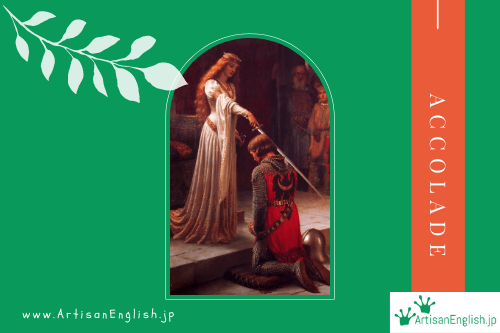
YouTube / iTunes / Spotify / Radio Public / Pocket Casts / Google Podcasts / Breaker / Overcast
Listen to ArtisanEnglish.jp posts & lesson intros here.
Word of the Day: Accolade
Well, this is the last new post for 2021.
Can you believe there are only eleven more days left until we wake up to welcome 2022?
We’ve gone through a challenging year, but we have survived it.
An accolade is praise or approval.
It’s a formal tribute or unique distinction given to someone for doing something extraordinary.
Often at the end of December each year, people think about the year ahead and what they can do to make it better than the year before.
I have a suggestion.
Let’s try to be a little more positive and more unrestrained in giving out our accolades.
At this point, you’re probably wondering what an accolade is and why we should give them out.
Well, an accolade is simply praise and approval.
Quite often, it’s a formal award given as a tribute or unique distinction to someone for something extraordinary they have accomplished.
The word originally comes from the ceremony where royalty confers a knighthood on someone.
In fact, ‘the accolade’ is the ceremony to confer knighthood.
You’ve seen it on TV where a king or queen takes a sword and taps it on a kneeling person’s shoulders.
Well, that’s ‘the accolade.’
Now, I don’t mean we should make more knights, but we ordinary folk can make it a point to praise each other more in the New Year.
People enjoy being told when they do a good job or achieve something.
If you are a manager, give a few more accolades to your subordinates in 2022, they’ll like you all the more for it.
Parents praise your kids, and teachers praise your students. (but not too much)
Also, it’s important to remember not to sell yourself short.
If you receive an accolade from someone, don’t deny it; embrace it.
You deserve it!
Flesch-Kincaid Readability Test
This post is understandable by someone with at least a 7th-grade education (age 12).
On the Flesch-Kincaid reading-ease test, this post scores 74.
The easier a passage is to read, the higher the score on a scale of 0 – 100.

